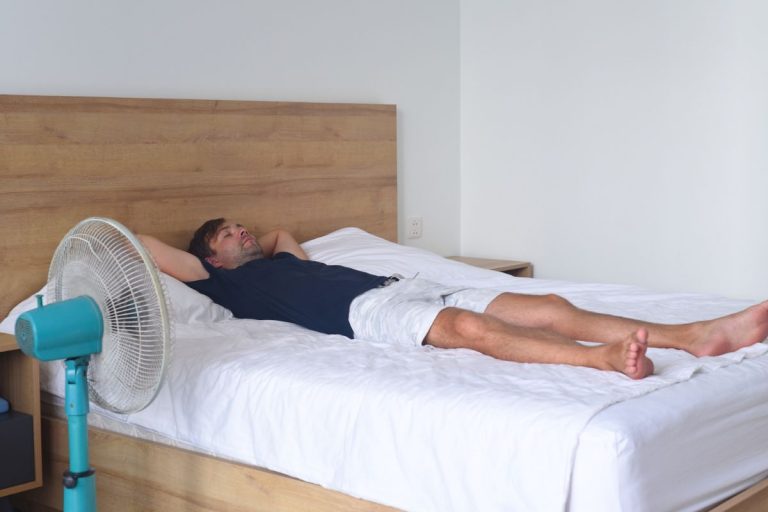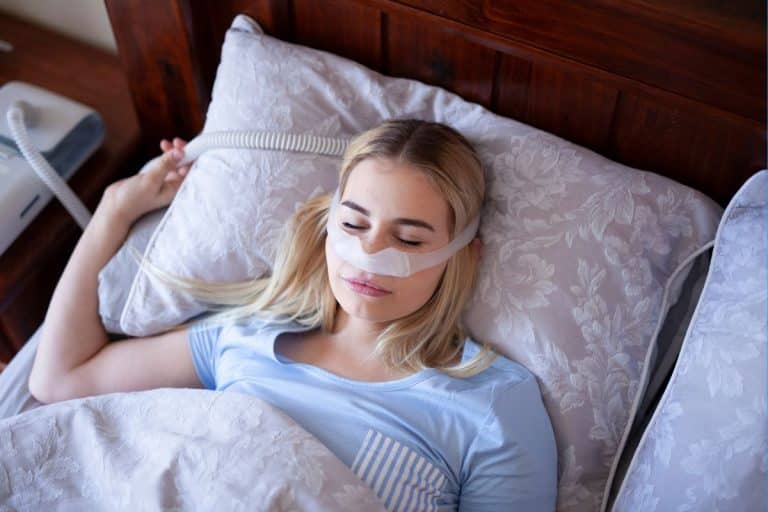Coffee and caffeine in particular are used to push off the need to sleep by a few hours and provide the necessary energy to complete certain tasks. However, that doesn’t mean that drinking coffee or other caffeine-rich products is a substitute for sleep. They won’t make you feel rested or refreshed as a healthy sleep cycle does.
With that in mind, it’s still possible to fall asleep after drinking coffee, although falling asleep could be a bit difficult as your fatigue has been pushed away by a few hours.
Generally speaking, caffeine and sleep don’t go too well together. They both form a crazy cycle where you drink coffee to prevent yourself from falling asleep. Then, when you want to fall asleep, you’re unable to, because you drank too much coffee or some other caffeinated drink.
There is still a cure. There are a few tips that you can stick to, to have an easier time falling asleep. Make sure to check them below, try them out, and see what happens.
What Happens When We Drink Coffee That Prevents Us From Sleeping?
Before we get to the tips to fall asleep after drinking coffee, let’s explain the chemical and metabolic processes in our organism after we drink coffee. What happens?
Because a lot of people enjoy the smell, taste, and sensation they experience after they drink coffee, drinking coffee is often considered an experience than a necessity. That also called for a lot of decaffeinated coffee brands to emerge, but that didn’t stop people from drinking the authentic coffee, as it’s much better.
Coffee rich in caffeine, the most popular legal energy stimulating drug provides a refreshing experience and higher alertness that allows us to do some tasks more vigorously.
Caffeine once in our bloodstream prevents chemicals that affect sleep such as serotonin that often triggers melatonin, and so on. It also blocks adenosine from reaching our brain to cause higher alertness.
With that in mind, once you drink a cup of coffee that can have anywhere from 180 to 250mg of caffeine, you’ll feel stimulated and more productive in performing tasks like studying or working. Higher alertness also helps maintain a steady focus.
Once we drink a cup of hot and soothing coffee, it enters our stomach, and from our stomach, it reaches the small intestine. It takes approximately 15 to 20 minutes for that to take place, after which, it enters our bloodstream and does the magic. Given this process can take up to 20 minutes, the effect follows shortly.
Our system takes anywhere from 4 to 6 hours to get rid of caffeine from our system, but even before that, the empowering and energizing effects of caffeine begin to wear off, leaving us feeling sleepy and often drowsy.
Still, if you drink coffee properly, and take the right dosages, some ways will help you fall asleep with ease.
Ways to Fall Asleep After Drinking Coffee
Below, we’ll discuss ways to help you fall asleep easier when drinking coffee. While not all options may work for you, it’s important to find a pattern that will work the best for you and stick to it.
Not drinking coffee before sleep is still the best way to fall asleep with ease, but if you do end up drinking coffee before bedtime, here’s how to fall asleep.
Make Smaller Caffeine Doses In The Afternoon And Evening
In the morning and early noon, it’s best to drink between 180 and 250mg of caffeine in a cup of coffee to stay alert and focused. According to experts, the maximum caffeine dosage that’s recommended is 430mg of caffeine, which is approximately two to three cups of coffee.
As the day draws to its end, it’s best to make weaker coffees, with a lot of water and milk, to make the effects of the caffeine smaller. That will result in a weaker caffeine stimulation that won’t block your sleep-inducing neurotransmitters in their entirety and will allow you to fall asleep easier.
More tips:
- Don’t drink more than two to three cups of coffee per day.
- Avoid drinking coffee in the late afternoon and evening.
- Mix coffee with milk to help you fall asleep easier if you head to sleep after coffee.
Take a Warm Bath
If you drank a cup of coffee in the evening or sometime before your bedtime, don’t worry. Not everything is lost and you’ll be able to fall asleep eventually. To let the time pass faster, you can take a warm and relaxing bath where you can relieve your nerves and prepare for bedtime.
A study has shown that warm bath therapy will be effective at relaxing you and improving your sleep cycle. A lot of sleep experts also recommend this practice as one of the most basic means that will improve your sleep cycle.
Also Read: Hot Showers Vs. Cold Showers: The Benefits of Both Kinds of Showers
More tips:
- Use relaxing shower gels with lavender extract.
- Try to diffuse essential oils into your warm baths such as lavender and mint oil that will help relieve the headache caused by caffeine and ultimately help you fall asleep without tossing and turning too much.
- Play relaxing and soothing music, or even a white noise (pink noise) machine to prepare your body and mind for rest as you’re taking a bath.
- Massage your body and face with a night cream to relax your facial muscles.
Create A Cool Or Cozy Sleep Environment
Depending on the season, you may want to prepare your bedroom and bed for your night rest. One of the key things to do is to ensure that your bed is sufficiently warm or cool. In the summer nights, it’s important to sleep in a cool environment of 67-75 degrees Fahrenheit.
During the winter months, it’s important to ensure that your bed is cozy, as well as your pajamas.
If you’re cold:
- Run a fan heater in your room, but not when it’s time to sleep.
- Make your bed and get as many blankets as you need to keep yourself cozy. You should also check the weighted blankets out.
- Blow-dry your pajamas with a dryer to warm them up to keep you warm.
If you’re hot:
- Use silken, cotton, and linen sheets as they are the most natural and breathable materials for your bed.
- Make sure that your bed has a cooling mechanism like breathable layers, latex, or gel memory foam.
- Use cooling mechanisms like bed fans or Chilipad Pad, or run an air conditioner in your room until it’s time to sleep.
In both situations, get a room humidifier to keep the air moist.
Also Read: 7 Best Bed Cooling Systems: Say Goodbye to Sweating at Night
Make Sure Your Sleep Environment Is Quiet
Creating a quiet and low-noise ambient is paramount for a peaceful night’s rest. However, when you live in the center of a city, that gets increasingly difficult.
But, it’s important not to leave devices like home appliances, TV, or radio on, which may prevent you from sleeping when you drink coffee.
More tips:
- Use earplugs if you live in a busy center or plan to sleep during the day.
- Use a white noise machine that can help you neutralize the loud ambient or neighbors.
Use Essential Oils
Sometimes when we abuse coffee before sleep, one of the best things that you can do is inhale essential oils with soothing and relaxing effects such as lavender, mint, chamomile, and others. Besides inhaling, you can also massage yourself with the oil as that can help you fall asleep.
Also Read: CBD Oil For Sleep And Insomnia: Does It Work As Expected?
More tips:
- Use lavender, chamomile, sage, mint, valerian, and sandalwood oils to improve sleep.
- Use essential oils with your air humidifier, if you own one.
Make a Magnesium Cocktail
It’s no secret that magnesium helps improve sleep and is popularly used along with melatonin in insomnia-treating therapies. However, finding the right magnesium option for sleep isn’t always easy.
According to a study, magnesium is effective in treating insomnia. Given that caffeine blocks neurotransmitter in charge of sleep, you can use magnesium to trigger those hormones again.
More tips:
- Make sure to use a magnesium cocktail that comes with magnesium-citrate as this option is the most effective when it comes to improving sleep.
- Combine magnesium with your melatonin therapy.
Try Meditating
A lot of people who struggle with falling asleep after drinking coffee, and in general practice meditation to help their body and muscles relax, and to empty the mind. Meditation can help your brain relax which ultimately leads to feeling more sleepy.
More tips:
- Besides meditation, try out light yoga or pilates to relax your muscles.
- Try stretching.
- Try meditating in a dark and quiet room.
Try A Power Nap
A power nap is a great way to restore your body and mind, especially when you’re sleep-deprived and have important things to attend to. You can combine power naps with coffee. However, it’s important to try to nap right after drinking coffee.
Power naps don’t last long and can last between 15 and 45 minutes. Your body will get an infusion of the rest and by the time they wake up caffeine from coffee will kick in, making you more focused and alert. According to a study power napping after drinking coffee helps with restfulness and focus while driving.
More tips:
- Try lighter options of coffee before napping such as flat white or latte.
- You can also drink a glass of warm milk before attempting to power nap.
More Tips
Here are a few more tips that are individual and have an anecdotal effect in helping you sleep after drinking coffee.
- Eat L-Theanine rich food such as Turkey.
- Drink a glass of hot milk.
- Drink coffee slowly so that you can determine when you’ve had enough caffeine and stop.
- Avoid drinking stronger coffee like black coffee and pure espresso.

